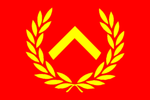People's Government of Pristinia
This article contains information pertaining to a fictional micronation, micronationalist or other fictional element of micronational society or culture. |
People's Government of Pristinia Фoлкcƞεpƨyнг Пpƨтεнйoxи | |
|---|---|
 | |
| Type | |
| Type | |
| Houses | People's Council People's Senate |
| Leadership | |
President (PS) | |
Chairman (PC) | |
| Structure | |
Political groups | Marxist Alliance of Pristinia |
Joint committees | Peace Committee Justice Committee |
The People's Government of Pristinia is the Legislature of the Autonomous Socialist Republic of Pristinia.
People's Council
The People's Council of the Autonomous Socialist Republic of Pristinia is the lower house of Parliament. It consists of all citizens, except for the Members of the People's Senate.
Any MPC (Member of the People's Council) may put up an act for petition. The People's Senate then examines it and votes on whether to affirm it or not. If it is affirmed, the People's Council must vote on whether to finally actually pass it or not.
If it is not affirmed by the Senate, which is a very rare event, the petitioner may not put the same proposal up for petition again in the ongoing legislative session. If it is affirmed, but it fails to reach a simple majority in the final People's Council vote, no one may put the same proposal up for petition again in the ongoing and next four legislative periods.
From time to time, this process may appear vice-versa. This is called a plebiconciliscite, or, less scientifically, a Popular Resolution. This way, an MPS (Member of the People's Senate) puts up a decision he needs to make for vote. This does usually not happen, since most decisions that only a specific MPS can make are also made by that MPS. Popular Resolutions are thus extremely rare and used only if the authoritative MPS is completely unsure of what to do.
People's Senate
The People's Senate of the Autonomous Socialist Republic of Pristinia is the upper house of Parliament. It consists of the President, the General Secretary, and the Chancellor of the ASRP.
Any MPS (Member of the People's Senate) may put a proposed law up for vote in the People's Council. Accordingly, any MPC (Member of the People's Council) may put a proposed law up for vote in the People's Senate. This type of law is called a bill, and a quicker way of lawmaking than with acts. However, bills are not supposed to be as severe as acts, and often concern more trivial and less grave changes and events.
There is also another form of lawmaking, apart from Act, Popular Resolution and Bill. It is called a petition. This confuses some, since the "petition" is already part of the process of creating an act. However one must distinguish between the petition which is a part of an act, and the solitary type of petition.
Basically, a petition is a list of options, composed by an MPC. The People's Senate then is given the petition, not to vote from the choices, but rather to confirm it. If it is confirmed, the People's Council then vote on the options. It is kind of like an election, but rather on grave decisions than on representatives in the MPS. It may be petitioned, for example, that the ASR change its form of government, its name, its flag and so forth.